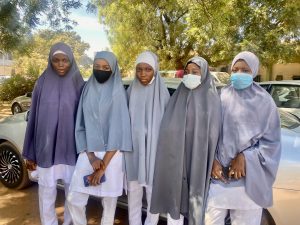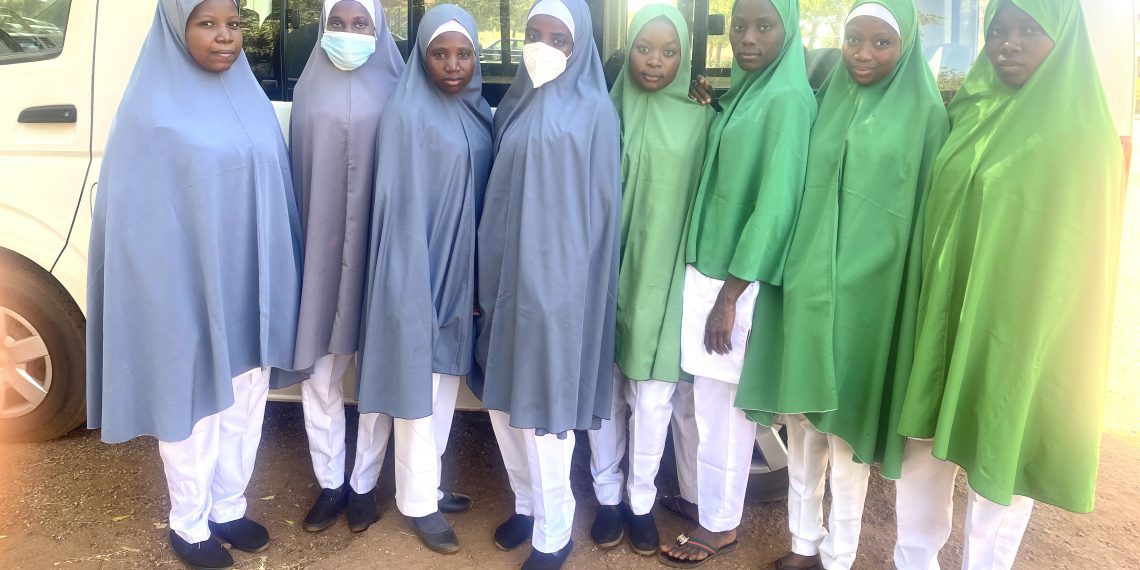Zainab Muhammadu’s parents refused to allow her to join the public primary school at Buda Community, in Gada Local Government Area of Sokoto State.
She had been willing to become a nurse due to the lack of staff and healthcare equipment at the Primary Health Centre in the community, as well as, the recurring health challenge among the residents, which was resulting in maternal mortality.
As a result of this, Muhammadu spent two years of her early stage helping her mother to hawk fried potatoes, until she later got the nod to stop.
“The family head had to come in, pleading that I should be allowed to go to school since it’s my passion. My parents had concluded that I would be married off when I finish senior secondary education,” recalled the 22-year-old Muhammadu.
According to the United Nations Children’s Emergency Fund (UNICEF)’s recent data, married adolescent girls are shockingly less likely to attend school, with a stunning 87% of them not attending.
Girls with little or no schooling are most likely to marry as children and out of the 18.5 million out-of-school children in Nigeria, 10 million are girls.
The report further revealed that girl-child marriage, which contributes to the low level of girl-child education in the country, is prevalent in the northwestern states of Jigawa, Katsina, Kebbi, and Sokoto.
About 23.6 million girls married before the age of 18 in the world, Nigeria has the highest number of girl child marriages in West and Central Africa.
Regrettably, one of the human right violations that prevent females from achieving their full potential is child marriage. This dangerous habit is ultimately related to the lack of access to resources, empowerment, education, and health.
In Kebbi State, Amida Maniru has a similar tale with Zainabu Muhammadu; the primary health centre in her community, Tsakiya, Birnin Kebbi LGA lacked workers that could attend to patients, particularly pregnant women. This forced many to travel for about 20 to 30 kilometers to Birnin Kebbi metropolis, in quest of access to healthcare services.
This situation, apparently, led to the deaths of people, including pregnant women, and invariably increased the rate of child mortality in the area.
But when Maniru got to Senior School II, in 2018, her parents introduced her to a man she would marry upon her completion of senior school education. Obviously, this negated the dream of furthering her education to become a nurse to save the lives of people in the community.
“My parents insisted that I must marry after my final exams in secondary school, but I had the passion to study nursing and become a health expert, so that I can lessen the health challenges in my community,” the 21-year-old Maniru said.
In Nigeria, the estimated maternal mortality rate is 39 per 1,000 live births, while the infant mortality rate is 70 per 1,000 live births, according to the National Bureau of Statistics.
A study by the NBS suggests that one in 15 live babies in Nigeria die before they turn one. Additionally, the death rate for children under five is predicted to be 120 per 1,000 live births, or 1 in 9 live births. Sokoto is the fourth-highest performing state in Nigeria, behind Jigawa, Kano, Katsina, Kebbi, and Zamfara, and before Nasarawa, Niger, and Bauchi.
Changing the narratives
Having noticed the problem of the shortage of health workers, which exacerbated health complications in the two communities in Sokoto and Kebbi states, Nana Girls and Women Empowerment Initiative, in 2018 launched the Girls for Health (GForHealth), an initiative, supported by Bill and Melinda Gates Foundation. The intervention adopts a twin-track approach where girls are equipped with adequate education in health and therefore able to address the health challenges in their communities. Simply put, the approach helps to increase women’s access to health services and girls’ access to education in rural areas.
Girlsforhealth adopts three approaches; the first was a visit to those communities, where they selected girls who had a dream to continue schooling after secondary school but couldn’t, due to early marriage plans, either by their parents or financial problems.
They selected SSII, and SSIII students from the rural area public schools — gathered them, and provided them with extra moral lessons, teaching them core science subjects and using a student-centred approach.
Secondly, they secured a school of nursing admission for the selected girls, paying for their tuition fees, feeding, learning materials, and shelters, giving them monthly stipends.
Also, in nursing school, the organisation arranged extra lessons for the girls so that they could cope with academics and perform well. They usually pay the lecturers a monthly salary for the special services.
Thirdly, they signed an agreement with both their parents and community leaders that after they graduate from nursing school; each of them would be posted back to their respective community’s primary healthcare centres to fill the staff shortage gap and cater to their people’s health conditions.
“There are two ways in which the organisation mitigates the out-of-school girls’ problem and promotes girls’ education. Firstly, we have a shortage of health workers in Northwest Nigeria, particularly Sokoto and Kebbi — which is far below the World Health Organisation’s (WHO) threshold.
“We used the health education method to bring back some rural community girls to the school of nursing, support them fully and make sure they go back and address the health challenges in their communities,” said Dr. Fatima Adamu, Executive Director, Nana Girls and Women Empowerment Initiative.
Adamu added: “Secondly, it is about girls’ education and women’s participation in education generally. When we realise that each rural area can take care of its people, but needs education. So, they need extra support in terms of education for the rural communities to have enough health workers.
“We select girls from rural communities, provide them with full opportunities and send them to school while the agreement was signed that after schooling; they will go back to their various communities to work in the primary health care Centres. We support them with extra lessons to get required.”
Since it launched the intervention, Nana Girls and Women Empowerment Initiative has provided quality educational opportunities to 450 girls in Kebbi and 375 girls in Sokoto respectively, thereby reducing the number of girls in Nigeria who lack access to education and skills.
For primary health care centres in Kebbe, Gada, Silame, and others whose selected girls supported by the organisation graduated from the school of nursing and now working as staff — and likewise in Kebbi at Yauri, Ngaski Shanga, Argungu, Jega, and other communities: are no more lacking health staff shortage as the girls supported by the nonprofit are now making an impact in their communities.
Zainabu Muhammadu’s dream later came to reality when the organisation visited her community secondary school in the Buda area of Sokoto and selected her to attend the school of nursing.
“Though it’s not as easy as we are discussing it now, my parents insisted then when I was in SS3 that I would get married but Nana organization stood for me to settle it with our community leader. That’s why they are left with no choice but to allow me. Now, after my internship, I will go back to my community health care center to work, ” Muhammadu said.
Similarly, Amida Maniru’s parents eventually agreed that she should further her education in nursing school —after the organization came to her community in Kebbi in 2018 and selected her.
“I am thankful to God for this opportunity provided through the Nana organization because I would have been married by now without having an opportunity to chase my dream to become a nurse. I can’t wait to go and join other girls who were among the first cohort of the program and already working in our health care center, ” she said.

Challenges loom
Despite the impacts of the Nana Girls and Women Empowerment Initiative to mitigate out-of-school girls and fight access to health weaknesses with education; the program comes along with challenges. First, some parents insist on marrying off the girls at a younger age while they have a passion for education.
“Some parents won’t ever agree that their daughters should join the school and insist on forcing them to matrimonial homes — which is not right. Also, some mothers would be going to the respective schools and shout that the organisation should release their daughter to come and hawk for them.
“Some of them later released their girls for us when we involve the government and query them about why they can’t allow their daughters to go to school and move to take them to court, ” Dr. Fatima L Adamu, the organisation’s ED said.
This story has been made possible by Nigeria Health Watch with support from the Solutions Journalism Network, a nonprofit organization dedicated to rigorous and compelling reporting about responses to social problems.

